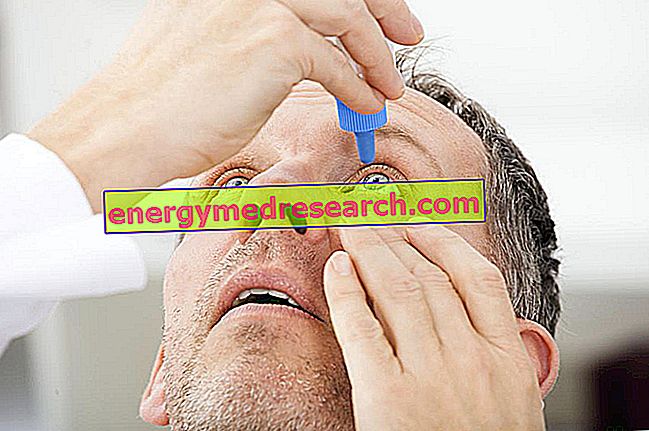Definition
Facial paralysis, also called Bell's palsy, is a disorder that affects the nerve involved in controlling the musculature of the face; when this nerve undergoes an inflammatory insult, it swells, consequently causing a rigidity to the face that prevents the correct use of the muscles of the site involved. More often the paralysis affects only one side of the face; however, the disorder can involve the whole face.
Causes
Although the specific cause is not fully accredited, it appears that facial paralysis is due to a viral insult: the etiopathological agent implicated therein is Herpes simplex, the same virus responsible for genital and labial Herpes. However, some sources believe that facial paralysis is also favored by HIV infections, Lyme disease, sarcoidosis and infections of the middle ear.
- The subjects most at risk are children under the age of 15 and adults over the age of 60; ideally, the disorder can manifest itself at any age.
Symptoms
Patients with partial facial paralysis present a characteristic "unilateral smile" and an obvious difficulty in closing and opening an eye. Among the other signs that accompany the disorder, we mention: alteration of taste, alteration of the amount of tears and saliva, difficulty in expressing the face, pain in the jaw and ear, hypersensitivity to sound, and rapid onset of muscle weakness in the muscles facial involved.
- Sometimes, paralysis can affect the entire face.
Information on Facial Paralysis - Drugs for Facial Paralysis is not intended to replace the direct relationship between health professional and patient. Always consult your doctor and / or specialist before taking Facial Paralysis - Medications for Facial Paralysis.
drugs
Fortunately, in most affected patients, facial paralysis tends to clear itself shortly after its onset; often, the symptoms improve already after a few hours and disappear after a few days or weeks. However, some facial paralysis occurs particularly abruptly: in similar situations, complete recovery can take place after a few months, also using powerful drugs such as corticosteroids (prednisone) and antivirals (acyclovir or valacyclovir). However, the usefulness of drugs for the treatment of facial paralysis has not yet been fully clarified; however, it has been observed that their therapeutic effect is appreciable when the pharmacological treatment starts already from the very first symptoms.
Parallel to drug therapy, it is advisable to follow a physiotherapy procedure: massages and exercises aimed at facial muscles prevent paralysis from progressing and causing permanent damage. Physiotherapy is often essential to promote complete recovery in a short time.
In extreme cases, surgical intervention (surgical decompression) is necessary to alleviate the pressure on the nerve; if facial paralysis disfigures the face, it is advisable to intervene with facial plastic (rare).
Corticosteroids : as we have analyzed, the so-called "idiopathic" facial paralysis tends to be self-resolving in a few weeks (2-6). The administration of corticosteroids is sometimes recommended to prevent any neurites; however, it is necessary to point out that the approach with powerful drugs of this kind makes sense only if their administration starts within the first 3-10 days after the outbreak of the condition. The steroid-based drugs are indicated to reduce inflammation of the facial nerve, given their powerful anti-inflammatory effect.
- Prednisone (eg Deltacortene, Lodotra): the dosage must always be established by the doctor on the basis of the severity of the facial paralysis and the patient's condition. Indicatively, the dose to be taken varies from 5 to 60 mg a day, possibly divided into several doses (1-4) during the 24-hour period. Take the drug within 3-10 days of the first symptoms.
Antiviral drugs : when facial paralysis is related to an insult sustained by Herpes simplex, antiviral drugs can exert their therapeutic effect, especially if associated with corticosteroid therapy. However, the effectiveness of antiviral therapy for the treatment of facial paralysis is not fully accredited: some studies confirm its effectiveness, others deny it. It will be the duty of the doctor to prescribe or not a similar treatment, based on the triggering cause, the severity of the condition and the general state of health of the patient.
- Acyclovir (eg Aciclovir, Xerese, Zovirax): the drug is an inhibitor of DNA synthesis of the herpes virus; it is therefore indicated for the treatment of facial paralysis with a viral etiology, always associated with a steroid. Take one 400 mg tablet three times a day for 7-10 days, in full compliance with what your doctor has prescribed.
- Valaciclovir (eg Talavir, Zelitrex, 500 mg or 1000 mg): indicatively, take one tablet of 250 mg, three times a day, for 7-10 days. It is recommended to combine antiviral with a steroid drug.
- Famciclovir (eg Famvir): it is recommended to take an oral dose of 250 mg twice a day. For patients also suffering from AIDS, increase the dose to 500 mg. The duration of therapy should be determined by the doctor. Combine a corticosteroid drug.
No scientific data are available on the use of antivirals as monotherapy for the treatment of facial paralysis. It is recommended to always combine a steroid.
Moisturizing eye medications : in the case of facial paralysis, the eye (or both eyes concerned) find it difficult to close completely. To avoid ocular xerosis (dryness), it is strongly recommended to apply regular eye drops or ophthalmic ointments that keep the surface of the eye moist. In some cases, it is advisable to cover the eye with a bandage during night sleep.
- Paraffin (eg Lacrilube ophthalmic ointment): paraffin-based ointments are indicated to promote lubrication of the eye, particularly when dry eye damages the corneal epithelium. It is recommended to apply the ointment just before bedtime, since the drug can cause a temporary blurred vision. Do not apply with contact lenses.
- Hypromellose (eg. Tioretin): this is one of the most suitable pharmacological treatments to obviate minor dry eyes, in the context of facial paralysis. In order to get relief of symptoms in a short time, frequent administration of the drug is recommended, about an application every hour for the first days of therapy.
- Acetylcysteine (eg Tirocular, Brunac): it is possible to apply this mucolytic drug in the form of eye drops, in association with the hypromellose, in the eye in order to restore the surface layer of mucus in the eye, clearly altered by local xerosis caused by paralysis facial.
For further information: read the article on drugs for the treatment of dry eyes



